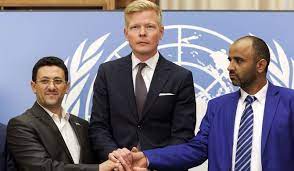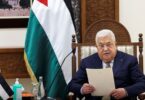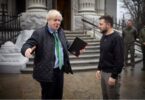Dr. Abdel Aziz Aluwaisheg
The diplomatic breakthrough announced between Saudi Arabia and Iran in Beijing on March 10 has raised hopes of progress toward a political solution in Yemen, where Iran has sustained the Houthi rebels with funding, training and arms, including drones and ballistic and anti-shipping missiles.
To seize on this rare opportunity, the European Council on Foreign Relations and the current Swedish EU presidency convened a meeting on March 17 in Brussels to explore how the EU and Gulf Cooperation Council could work together to move things forward. The meeting included officials and experts from Yemen, the GCC and the EU, in addition to the UN, US and Sweden’s special envoys to Yemen. The systematic engagement between the GCC and Yemen started in 2001, when Yemen joined the GCC institutions on education, health, labor and sports, followed later by six additional organizations. In 2002, the Sanaa Accord was signed to align Yemen’s economic laws with those of the GCC. In 2006, a joint GCC-Yemen committee was tasked with studying Yemen’s development needs and ways of integrating its economy into the GCC’s. The UN, World Bank, OECD and others helped in that effort. The committee agreed on a 20-year timeframe for integration and, in 2006, mobilized about $6 billion, 70 percent of which came from GCC donors, for Yemen’s development needs.
That process of GCC-Yemen integration was partially sidelined in 2011 as focus shifted to managing the political crisis resulting from widespread protests. Through the GCC Initiative, a power-sharing agreement was reached in 2011, with early elections and a transitional government in early 2012, following which the joint committee mobilized another $9 billion to fund the transition, with 80 percent coming from GCC sources, especially Saudi Arabia. The GCC also helped fund and organize the National Dialogue Conference in 2013-2014. However, with Iran’s support, the Houthis overthrew the government in September 2014 and Yemen descended into the civil war that has continued ever since. The GCC has sided with the internationally recognized government. Despite the war, Yemen’s further integration with the GCC nevertheless remained a stated goal, although it became more difficult to pursue as focus and resources shifted toward peace-making and providing urgent assistance to the millions of Yemenis who became dependent on outside help.
In March and April 2022, the GCC hosted in Riyadh about 1,000 Yemenis from the government, parliament and civil society. Although the Houthis were invited, they chose to stay away. The 10-day talks resulted in a new power-sharing arrangement – the Presidential Leadership Council. A truce was announced during the talks and that has held since April 2, 2022, which is unprecedented in this conflict. But despite the UN and the Presidential Leadership Council’s valiant efforts, there has been no movement toward a political solution, while the economy has stagnated and the humanitarian situation remains worrisome.
The Saudi-Iranian deal may change all that and create the momentum needed to break through the obstacles that have plagued Yemen’s peace-making. While strictly speaking an agreement to resume diplomatic ties and reopen embassies, the deal has a greater symbolic and psychological impact, not only in Yemen but throughout the region. Direct Saudi-Houthi talks have also contributed to the new cooperative atmosphere. This new climate may explain the sudden conclusion of a prisoner swap deal. On Monday, agreement was reached between the government and the Houthis to release 877 detainees after more than four years of negotiations.
Like the GCC, the EU has expressed a deep interest in helping Yemen transition from war to peace, reconciliation and stability. Last year, the two blocs agreed on a new strategic partnership framework that could serve as a mechanism to cooperate on Yemen, utilizing this rare moment of optimism after the Saudi-Iran breakthrough and the Saudi-Houthi talks in Sanaa. I presented six main priorities for discussion in the Brussels meeting last week. The first was supporting UN efforts to maintain the informal truce. Ramadan and the holidays make it likely to continue, but it should be formalized and, if possible, turned into a ceasefire.
The second priority was UN-mediated political talks, which have so far failed to make progress. The prisoner swap earlier this week was significant, but it should be followed by other steps, including progress on the Taiz blockade and Hodeidah revenue sharing. Third was Presidential Leadership Council unity and empowering it to manage the economy and strengthen state institutions.
Fourth was humanitarian assistance. During last month’s pledging conference for Yemen in Geneva, only a fraction of the UN’s funding goal was met, as donors shifted their attention to the Ukraine war and the aftermath of the Turkiye-Syria earthquake. Fifth was development assistance. While Saudi Arabia and the UAE have continued to provide significant development aid, most other donors have focused their efforts only on humanitarian assistance.
The final priority was security. The GCC and EU have recently agreed to increase their security cooperation. A good place to start is maritime security, safeguarding the freedom of navigation and reducing arms smuggling to Yemen. The guiding principle in all of this should be promoting GCC-Yemen integration as a goal. The EU could help maintain that focus, as it is the paramount example of successful integration, while taking into consideration Yemen and the GCC’s special particularities.
Despite many obstacles, the GCC and Yemen are destined to integrate. Their shared geography, history and culture make it inevitable. Economic logic and the complementarity between the two sides argue for cooperation and against conflict. They need to complete the process of integration that was started 22 years ago and gained significant momentum between 2006 and 2011, but has since derailed. The GCC-EU partnership could serve as a useful tool to overcome the inevitable challenges of integration and make it happen faster.
Arab News







